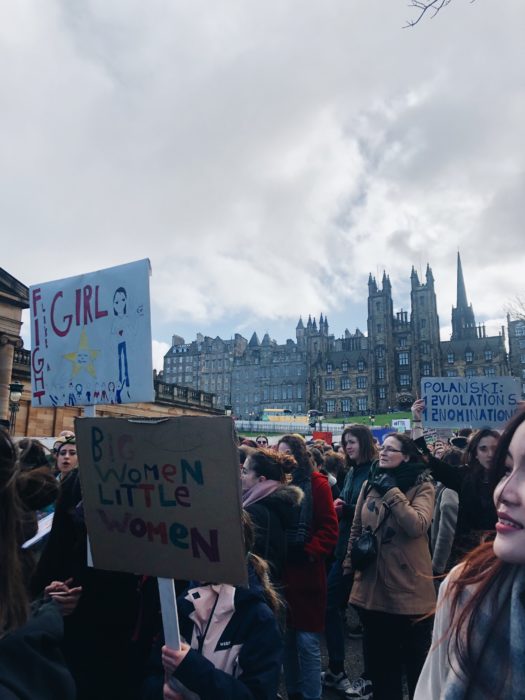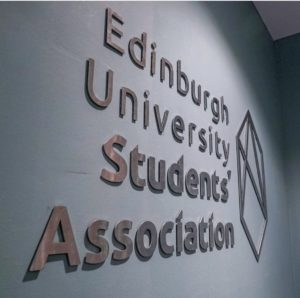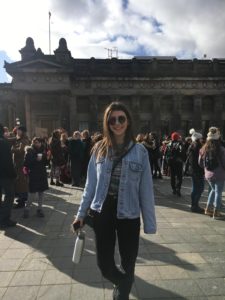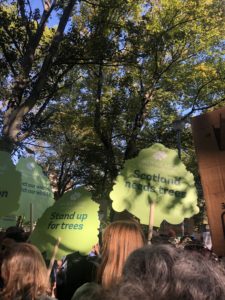15th September 2021 Skopje, North Macedonia
What does democracy mean to you?

The year 2020 will be remembered by the world pandemic and the imposed restrictions on the daily lives of people worldwide. In the duration of the global pandemic, many countries imposed quarantines, police curfews, closed non-essential places, and completely changed the lives of millions of people. For many of us, it was the first time facing restrictions in our freedoms. I remember the initial shock when I received the news that the airports in my home country are being closed and what was supposed to be a year of traveling quickly transformed to ‘closed borders’ and ‘one walk per day’ kind of year.
The situation is well-known to everybody, as many of us were in the same situation. And in those “restricted” times of closed borders, shops, restricted movement, curfews, we started to realize the privileges we were enjoying before all this started. In the news, one often heard the question of whether those restrictions fall upon the definition of democracy. And by asking ourselves this, we started looking into the meaning of democracy.
As a master’s student of Public Policy and Bachelor in Journalism, I encountered the textbook definition of democracy countless times through my studies. If one looks into the textbook meaning of democracy, there are plenty of them. But every definition ultimately defines a form of government that protects and ensures its citizens’ freedoms. In 2020, 49.4% of the global population lived in a type of democracy (full or a flawed one) and an additional 15% lived in a hybrid system. But unfortunately, this percentage of 65,4% of us have taken the benefits of the democratic way of governance for granted.
Regardless of the definition of democracy, usually, it is our perspective that creates the personal meaning of the term. My perspective was built upon my integration and perception of the societal processes I have been included in since my earliest age. I remember the first-grade election for the president of the class from the two candidates proposed by the teacher as the first encounter with a somewhat of a democratic process. Years later, I started my master’s year at the University of Edinburgh and I joined the Student Association of the University. I was welcomed by the elections of the Association’s Governing Body and by the enormous choice of people I get to elect as people that will represent my voice to the University. Then I remembered that maybe what I considered before in first grade as a fair election for president lacked many elements of democratic elections.
Living in the United Kingdom which is considered as a full democracy during the global pandemic has shown me different approaches to a functioning democracy. The University campus in Edinburgh was a safe place for students to express themselves and the Students Association and the University itself worked for the benefit of the students and protected their rights and freedoms. I recognized the trust students put in their elected peers to represent them and during the pandemic the trust in the national government. And in return, it was ensured that the University remained a democratic environment where students can express themselves, have multiple chooses on everything important to them including the people who lead them, and most importantly, have the opportunity to change what previously have demonstrated to be insufficiently good.
Compared to the UK, North Macedonia is a country still in the transitioning period . That being said, reform processes that are increasing the democratic values are on-going. These processes need to be youth-inclusive. The Youth Studies SEE 2018/2019 shows that young people have a predominantly dissatisfied attitude towards democracy in North Macedonia, and they are actualizing distrust in the national government. An inclusion of youth in decision-making processes, and educating the young people on the importance of their engagement in the political and socio-economic sphere will create a positive environment for young people and their opinion. They will feel ownership and encouragement in taking a part in the on-going democratic processes and by that increase their trust in democracy and the governing institutions.
 Political trust is crucial in democracies. Political trust ensures us that the elected people in institutions will work for our good, even in a global pandemic. Unfortunately, many factors such as corruption, populism, inequality, poverty, and plenty more have decreased the trust people put in their government. As a country aiming towards a European future with all of its democratic values, young people should be the leading force of European integration. That way, the institutions can stop the increase of young people who are becoming more euro-skeptical and decrease their doubt in the democracy.
Political trust is crucial in democracies. Political trust ensures us that the elected people in institutions will work for our good, even in a global pandemic. Unfortunately, many factors such as corruption, populism, inequality, poverty, and plenty more have decreased the trust people put in their government. As a country aiming towards a European future with all of its democratic values, young people should be the leading force of European integration. That way, the institutions can stop the increase of young people who are becoming more euro-skeptical and decrease their doubt in the democracy.
In order to improve we have to map the flaws and look for solutions. Democracy is not perfect, but recognizing the flaws and learning from each other will at least show us the places we need to improve. To increase the trust in democracy and the government, young people have to be included in every democratic and decision-making process so their perspective on democracy can be listened to, considered and properly implemented in the country.
Note: British Embassy Skopje offers its blog platform for guest posts. The views expressed in the guest posts are those of the authors.
